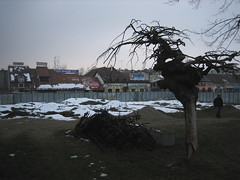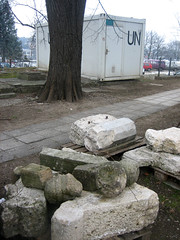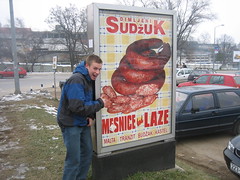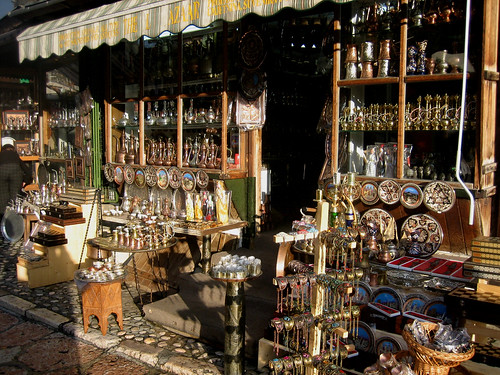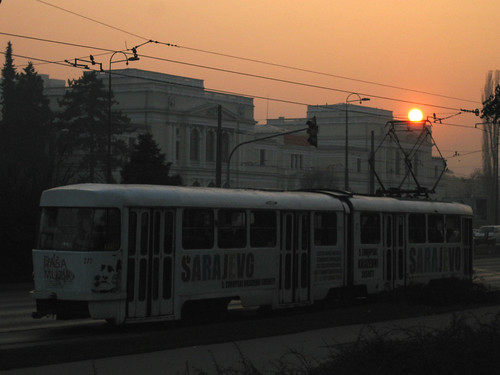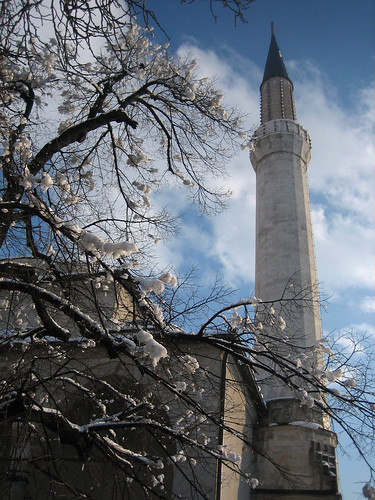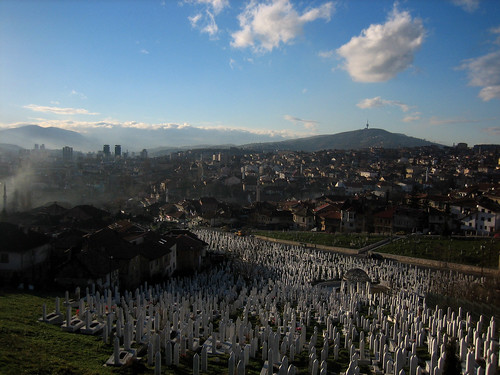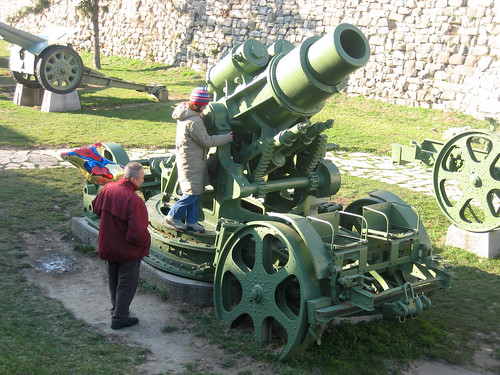 In the main park of Belgrade. I do not know where or when this artillery was used -- I can only speculate, but I'd rather not. See more photos from Belgrade.
In the main park of Belgrade. I do not know where or when this artillery was used -- I can only speculate, but I'd rather not. See more photos from Belgrade.
I came to Sarajevo with an open mind. I believed the war was simply a human tragedy and that there was no use in pointing fingers. But living with the victims of war means having those assumptions constantly challenged. The Serbs were the villains, you are told. They attacked unprovoked, killed thousands of innocents, and, worst of all, continue to deny and antagonize. I listened respectfully, but continued to insist to myself that these were just natural responses to trauma, in fact dangerous beliefs.
But as time went on, cynicism seeped in, tolerance faded. It began with anger. The siege of Sarajevo, the longest in modern warfare, must rank as one of the great crimes of history. I stared at bullet holes and shell craters in residential neighborhoods every day. Most of all, there were the horrifying anecdotes from people I knew.
But maybe this happened to both sides, I told myself. They were just stories, possibly exagerrated and not representative. So I turned to the facts. There were, for example, the rulings of the ICTY. Nearly every major Serb political leader and military commander had been indicted or convicted for crimes against humanity. On the other hand, the highest ranking Bosnian Muslim sent to the Hague was General Sefer Halilovic, in charge of only one region of Bosnia and accused of massacres against Croats in the west. He was recently acquitted.
Serbs often charge that the ICTY is biased, funded by vengeful Americans. But I have read the judgments, and there is no denying the mountain of evidence. I also work with many former prosecutors from the ICTY, and I know they are dedicated and impartial. Most importantly, I still can't figure out why America would spend so much energy and billions of dollars on villifying a tiny country like Serbia (Serb nationalists say it is because they were Communists, or that they are a vital trade conduit between East and West, or a number of other delusions).
What of the history? There is much debate, but here is a telling fact: no battle was ever fought on Serbian soil in the 1992-1995 war. How could Serbs claim to be defending themselves if their country was totally unscathed? Almost every historian has concluded that the Bosnian war amounts to a clear case of a "war of aggression," not a "civil war."
So it was with a sense of trepidation, but mostly burning curiosity, that I traveled to Belgrade last weekend, accompanying my best friend Knute to the airport for his flight home. I wanted to get a feel for Serbia, to prove to myself that it was just another poor, struggling country trying to right itself.
The first night we had dinner with a couple Serb friends of Knute's family. We were talking politics, and I almost choked on my food when one of them mentioned that 45% of Serbians had voted in 2004 for a party called, believe it or not, the Serbian Radical Party (at least they're honest). Their leader is a man named
Vojislav Seselj, who commanded extremist Serb paramilitaries during the war and was one of its most despicable criminals. In a 1996 documentary he bragged about the effectiveness of his ethnic cleansing campaign, and he ranks amongst the worst mass murderers of the war. Today, Seselj sits behind bars in the Hague. Together with Milosevic's old SRS Party, almost 50% of Serbian voters in 2004 supported parties whose declared leaders are in prison for crimes against humanity. I dread to think that the ongoing controversy over Kosovo's independence will give the Radical Party the few extra percentage points they need to take power. Since I discovered this fact, I take those who tell me that war will come again to the Balkans a lot more seriously (nearly every Sarajevan believes this).
Of the Serbs I met, mostly young people, I asked a few of them if they had ever been to Sarajevo. None had. "It would be weird for me. I don't really want to," one guy explained. I was taken aback. Many of the young Muslims I had met in Sarajevo had visited Belgrade. It's a great party town, after all. They had even given me recommendations of good clubs to visit. Sandra, who told me about the election results, had been to Jahorina, a Bosnian Serb ski resort only 20km from Sarajevo, but never to the city itself. I can only speculate, but I suspect this is partly due to the perception of Bosnians their culture imbues them with, but also a sense of deflected guilt -- they would have to see with their own eyes the devastation wrought in the name of their country.
Speaking of devastation, one can see several destroyed buildings in Belgrade, the result of NATO bombings in 1999. Rumor has it the government purposely leaves them unrepaired. Regardless, the few buildings, which compare laughably to the widespread devastation of Sarajevo, are emblematic of the myth of Serbian victimization.
A pro-soccer player, Boska, who once played for a Sarajevo team and told me he loved the city because the people were so accepting of him, told me about the devastating demographic toll Serbia had taken for experiencing 3 wars in 10 years (1991 in Croatia, 1992-1995 in Bosnia, and the 2-month long bombing by NATO in 1999 over Kosovo). Boska said that because of these tragedies, the ratio of women to men in Belgrade was 7 to 1. Sandra told me 9 to 1. This was a great confidence booster for me, as I prepared to be marauded by hordes of beautiful, desperate Serbian girls. Needless to say, expectations were set a little too high. A simple Google search reveals that
the ratio is actually more like 1.07 to 1. Maybe Boska just misplaced the decimal.
At a bar I met a young Serb named Vlado who worked in London for Deutsche Bank. He had recently graduated from Rutgers University in New York. I asked him if he had received a scholarship from the American government, as many Bosnians often do. He chuckled and said "Of course not! Only these Bosnians who
claaaim they were in concentration camps get money. It's such bullshit."
I wanted to like Serbia. I wanted to be able to return to Sarajevo and tell my Muslim friends that Serbs were just like them, that it was all a big misunderstanding and you should all sing kumbaya and be friends. If you avoid politics, Belgrade is a fascinating, fun and vibrant city of 2 million people. But something is undoubtedly rotten in the state of Serbia.
Driving back from Belgrade, we got lost in the Serbian countryside near the Bosnian border, the heart of extreme nationalism. We rolled through town after town of delapidated towns sunk in the depths of poverty. They looked just like Bosnian villages. The same brick huts and tile rooves, the same groups of tired-looking old men sitting on benches. The same kids kicking around an old ball. The same garbage-ridden rivers, beat-up Yugos and VW Golfs, and weathered faces. Only there was a steeple on their church instead of a minaret, and instead of nestled among mountains they were surrounded by muddy plains.
I recalled the dinner in Belgrade where I was offered a "Serbian delicacy,"
cevapi, a sort of hamburger. In Sarajevo they call this a "Bosnian delicacy" and in Croatia it is, of course, a sacred dish of ancient Croats. Language is another exmaple. Basically everyone speaks the same language in the former Yugoslavia, only slang varying by region. And yet people will tell you, depending on where you ask them, that they speak either Serbian, Croatian or Bosnian, even though the differences between them are probably less than between English in New York and Boston. If there is one thing that continuously baffles me about division and hatred in the Balkans, it is how utterly similar the various "ethnicities" actually are.
It is worthless and wrong to blame the Serbian people writ large, for as a whole their only crimes are ignorance and desperation. As I realized from the drive, their contact with the outside world probably consists only of what the few state-run television networks tell them. Propaganda under Milosevic was thorough, and the war can largely be characterized as a gang of thugs and murderers hijacking a weak-minded populace. Then again, I can't explain why some choose to be misled even now, like the Rutgers graduate, presumably educated and enlightened, who was so dismissive of Serbian atrocities. I have heard that it is often the emigrants who are the most extremist.
A theme emerges, I think. As Hemingway said, "The closer to the front, the better the people." Bosniaks and Sarajevans have seen with their own eyes what evils nationalism brings and realize that the only real protection against hatred is peace. But in Serbia, little of what they know of the war is real or tangible. They live much as Germans did after WWI -- in a landscape largely untouched by war, convinced of their own victimization, and sure that if only they had pushed a little harder they would have defeated the enemy once and for all. Perhaps once and a while the radicals mutter to themselves: "Maybe next time." As one author put it, Serbs live "with their backs to the world," and until something forces them to turn around and look at what has been done to their own neighbors in the name of a Greater Serbia, war may indeed return one day to the streets of Sarajevo.
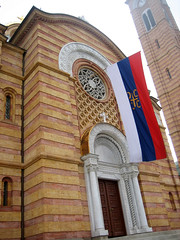 Last week I took a trip to Banja Luka, the second biggest city in Bosnia and the capital of the Republika Srbska (Serbian Republic), the nation within a state. The RS is officially an "Entity" of Bosnia-Herzegovina, a darkly comical term chosen because it hovers between the too weak "province" and the politically charged "nation." For all intents and purposes, however, going to Banja Luka from Sarajevo is like stepping into another country.
Last week I took a trip to Banja Luka, the second biggest city in Bosnia and the capital of the Republika Srbska (Serbian Republic), the nation within a state. The RS is officially an "Entity" of Bosnia-Herzegovina, a darkly comical term chosen because it hovers between the too weak "province" and the politically charged "nation." For all intents and purposes, however, going to Banja Luka from Sarajevo is like stepping into another country.